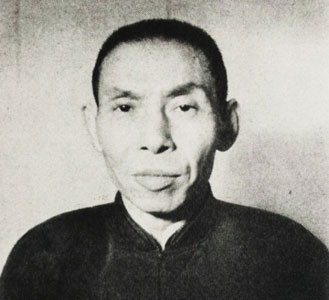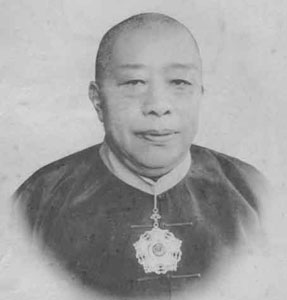The name Shanghai has always been synonymous with vice – drugs, gambling, loose women, sailors on shore leave, heavy drinking, and that’s just these days. Back when Shanghai was under colonial rule, it was even more immoral. The city was ruled by gangs, which in turn were led by some of the most colourful characters in Chinese history. However, these guys haven’t made it into the history books with quite so much patriotic zeal as Zhou Enlai and Sun Yat-Sen. But digging a bit deeper into the darker crevices of the past reveals a world of intrigue, deception, and depravity – men who fed ex-mistresses to tigers, former fruit sellers rising to the rank of mafia bosses, politicians collaborating with crime chiefs, and everything in between.
Up until the Civil War, Shanghai was ruled by an underground gang called Qìng Bāng (青帮) or the Green Gang. The group had been set up by Shaolin Fong Toh Tak to protect the Hans oppressed by the Qing uprising and try to reinstate Ming power, and steadily grew in numbers and wealth until it controlled the whole of the city. In the upper echelons of the gang were the three men who controlled Shanghai. The one who eventually ruled supreme started life in 1887 as Du Yuesheng, son of a poor family living in Gaoqiao Village in Pudong. Young Du was attracted to the shadowy side of life from an early age, but managed to hold down a job at a fruit market until he was in his early twenties despite his penchant for gambling. However, he was caught stealing and sacked. As luck would have it, a criminal friend of his had connections with the Green Gang, and put him forward for membership.

'Big Ears' Du Yuesheng, Photo: thegeneralissimo.net
With high hopes of a new life as a crime baron, Du packed his bags and moved into the Tian Song Lodging House on the Bund. But he didn’t immediately make his mark. He was assigned only small jobs, and began to lose hope of hitting the crime big time; rather than becoming the underworld boss he had dreamed of being, he was only earning enough money to support himself and stoke his gambling habit. But his fortunes eventually changed. On the advice of a fortune teller, Du left the lodging house and moved in with his friend Don Asan. Asan had connections to the big boss of the Green Gang, Huang Jinrong, also known as Pockmarked Huang. As a lowly rookie in the gang, Du had never even got close to meeting Huang, so this was an incredible opportunity, and a deft stroke of luck. Huang liked the cut of Du’s jib, so assigned him to a position managing opium transport through a warehouse in Hongkou. It proved to be a good and profitable partnership. Soon Du was moved to a more important warehouse on the Rue du Consulat (now Jinling Dong Lu), from which he formed a cartel uniting the city’s main opium gangs.
As the man they called Big Ears Du’s power and reputation grew, he began to crave ultimate supremacy. But the job he coveted – big boss of the Green Gang – was being eyed by someone else. Hangzhou-born Zhang Xiaolin was a notorious criminal with a love of gambling, women, and rabble-rousing. Rumour had it that he once fed a disgraced mistress to his pet tiger. Zhang and Du battled it out for power, but it was Big Ears’s allegiance to Nationalist leader Chiang Kai-Shek that eventually led to him gaining power. That, and an unfortunate incident in a jazz bar in which a bloody fight led to Huang Jinrong’s disappearance. Du later rescued his comrade, but Huang never regained face.
As leader of the Green Gang, Big Ears allied himself closely with Chiang Kai-shek, with mutual benefits. He helped finance the Nationalist party and became a man on the ground for Chiang, and in return Chiang allowed Du’s criminal activities to pass under the radar. At Chiang’s behest, Du engineered and led the 1927 White Terror massacre in which hundreds of pro-Communists were killed. As a reward, Chiang made him a general, and offered him a variety of political positions and rewards. Du was particularly helpful when war broke out against the Japanese, helping goods to pass in and out of occupied areas.

'Pockmarked' Huang Jinrong, Photo: Archives diplomatiques
However, the two were not to remain thick as thieves forever. After World War II, the Kuomintang was less willing to be associated with criminal activity. Chiang Kai-Shek’s son Chiang Ching-Kuo initiated an anti-corruption drive in the late 1940s during which many of Du’s relatives were jailed. Du retaliated by threatening to blow the whistle on the crimes and misdemeanours of Chiang’s own family. Thanks to this rift, Du didn’t join the Nationalists when they retreated to Taiwan in 1949. He went to Hong Kong instead, and died in 1951 before he could end his exile and return to Shanghai.
Zhang Xiaolin, on the other hand, stayed in Shanghai to help the Communists. This change of heart was down to a long grudge he had harboured against Chiang Kai-shek who had refused to give his son a bank job. Treacherous Zhang had to sleep with one eye open, as there was a price on his head. He survived two assassination attempts by scorned Nationalists, but was eventually killed by his own bodyguard who had been bribed.
The story of Big Ears, Zhang, Pockmarked Huang and the Green Gang is the stuff that Shanghai legend is made of. Their legacy no doubt lives on, as much of the city’s infrastructure was financed by their activities. Next time you’re in Donghu Lu, take a closer look at the Donghu Hotel. This was Big Ears Du’s home for much of his reign of terror. If only those walls could talk.
***
Related Links
Urdu to Uber-Modern: A Brief History of the Bund
May 4th Movement: Not Just a Rap Song
The Fabric of History – A Century of Chinese Flags and the Stories Behind Them (Part 2)
Warning:The use of any news and articles published on eChinacities.com without written permission from eChinacities.com constitutes copyright infringement, and legal action can be taken.
All comments are subject to moderation by eChinacities.com staff. Because we wish to encourage healthy and productive dialogue we ask that all comments remain polite, free of profanity or name calling, and relevant to the original post and subsequent discussion. Comments will not be deleted because of the viewpoints they express, only if the mode of expression itself is inappropriate.
Please login to add a comment. Click here to login immediately.
haha, yeah, there is no mafia in china, there's no polution or corruption either. lol
May 06, 2012 20:17 Report Abuse